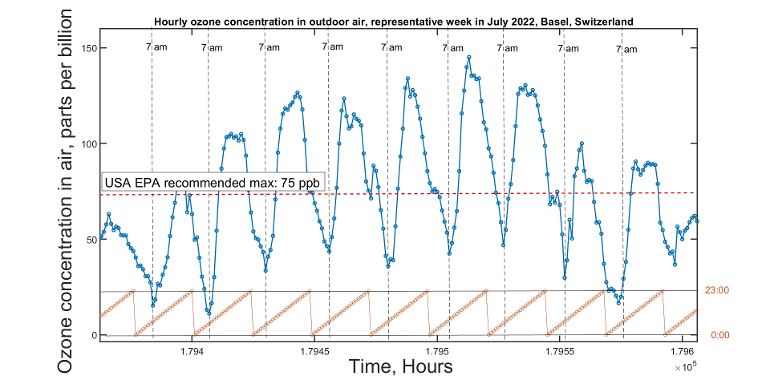I have posted here about 2 weeks back asking what others thought about the reason behind their variation of asthma symptoms throughout the day (morning vs evening), especially outdoors. Sorry for the long post, just had to get this off my chest.
It's been hot and sunny here in Basel, CH, for the last 2 weeks. Even though the tree and grass pollen is mostly gone, I still feel chest-tight outside or when opening the window; and it's worse in the afternoon. Staying indoors helps; wearing an FFP mask outside (which is supposed to take care of PM2p5) does not. I always attributed the asthma on hot days to humidity, pressure, temperature, or the inefficiency of the mask to filter particulates. Then my Swiss GP told me about ozone and NO2. I knew about these triggers, but I thought that only notoriously polluted cities like London or LA should be worried.
So I checked hourly ozone data from a nearby station in Basel (located two blocks away), and it is consistently low at night (reaching a minimum at 7 am at ~20-40 ppb) and is consistently high during the day (reaching a peak at 3-4 pm at 120+ ppb, when I am starting to get tired of my chest symptoms and usually need my rescue inhaler). They have data going back to 2000, hour by hour, and the ozone periodic pattern repeats day after day; it's also worse in the summer (more sunny days) than in the winter. 60-75 ppb ozone has been shown to cause inflammation and to affect lung function: there is a rather long document about this by the US EPA (with references):
govinfo.gov/content/pkg/FR-....
I am not saying that my daily variation of asthma symptoms is all due to ozone, but I think O3 definitely contributes, and there must be synergy between pollen, O3/NO2. All my major asthma attacks in the last 3 years took place on hot sunny days, even while I was wearing an FFP2 mask (which filters the particulates, but not the O3). Having two major factors -- pollen and ozone -- at their lowest in the morning is a strong case for venturing outdoors early in the morning -- e.g. for exercising, which I really need to stay sane. Wearing a respirator with activated charcoal cartridges helps (I can even ride my bike in it), and this is consistent with the literature that claims that charcoal removes some of the ozone:
escholarship.org/uc/item/87...
In sum, it appears that every season has something to offer for the asthmatics. In the winter, it's the smoke from the burning wood and charcoal and dry/cold air (but no ozone and/or pollen). In the spring, it's the pollen, the grass-burning, and the odor of fertilizer. In the summer, it's the ozone, the pollen, and the air pollution. In the autumn... I feel mostly OK in the autumn, actually, but others mention mould from the decomposing leaves. My defenses are Xolair, steroid inhalers, the rescue inhaler, rescue steroids, an FFP2 mask (if particulates are the problem), a full respirator (when ozone or smells are a problem), staying indoors, exercising indoors, and my "safe space" in the filtered-air tent (HEPA+activated charcoal).
